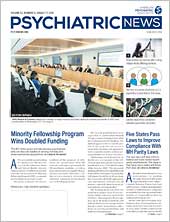Adjunctive Withania Somnifera May Reduce Some Schizophrenia Symptoms
Patients with schizophrenia who continue to experience symptoms while taking antipsychotics may benefit from adjunctive treatment with a standardized extract of Withania somnifera, suggests a small clinical trial. Withania somnifera (Ashwagandha)—a plant traditionally used in Indian medicine—is known to have anti-inflammatory and immunomodulating properties.
Researchers at the University of Pittsburgh assigned 66 adult patients with schizophrenia to take Withania somnifera capsules (initially 250 mg then titrated up to 500 mg) or placebo pills twice daily in addition to their antipsychotic medication for 12 weeks.
Beginning at week 4 and continuing until the end of treatment, patients in the group taking Withania somnifera capsules showed significantly greater reductions in negative symptoms (such as emotional or social withdrawal), general psychological symptoms (such as anxiety or impulse control), and stress compared with participants in the placebo group. The groups demonstrated no differences in positive symptoms.
The Withania somnifera capsules were well tolerated, and they did not cause any weight or metabolic problems for the participants.
The study was published in the Journal of Clinical Psychiatry.
Study Points to Connection Between Sleep Deprivation, Alcohol Intoxication
People who are sleep deprived exhibit similar behaviors to people who are drunk. A study published in PNAS has found a biological connection between sleep deprivation and alcohol intoxication.
Researchers in Germany and colleagues compared attention and reaction time in 49 young adults (average age 26) following alcohol intake (to reach a blood alcohol level of around 0.07), one night of total sleep deprivation, or one night of partial sleep deprivation. The study was designed so that each participant was exposed to all three scenarios, with recovery time in between.
The researchers found that participants who performed better on these cognitive tests following alcohol intake were also more likely to do better on the tests following sleep deprivation.
The researchers next compared PET scans of 10 other healthy adults who had consumed alcohol or water. They found that alcohol intake was associated with more adenosine in several brain regions. Previous research has linked sleep deprivation with increased levels of adenosine in the brain. Too much adenosine blocks the activity of cholinergic neurons that promote wakefulness.
The study authors wrote that showing the effects of sleep deprivation and alcohol intoxication may originate with the same biological process could have important ramifications.
“Reports indicate that young drivers believe driving drowsy is less of a serious problem than driving under the influence of alcohol,” they wrote. “Our finding of a shared physiological basis raises awareness for the still underestimated danger of driving while sleep impaired.”
Modified Botox Found To Reduce Pain in Animals
Synthetic versions of botulinum toxin, also known as Botox, may offer long-term pain relief, suggests an animal study by investigators at the University of Sheffield in England.
The researchers modified Botox to block either the neurokinin-1 receptor (NKIR, which sends pain signals from the spinal cord to the brain) or the mu opioid receptor (the target of morphine and related opioids).
A single injection of either molecule into the spinal cords of mice provided pain relief for up to 22 days without causing any neuronal death. The two molecules had no effect when injected in mice that lacked the relevant receptor (NKIR or mu). This indicates that these botulinum constructs specifically target these receptors, which lowers the risk of unwanted side effects.
These two modified Botox molecules did not provide stronger pain relief if given together. This suggests the NKIR and mu opioid receptors are part of the same pain network.
These findings were published in Science Translational Medicine.
Nitrates May Be Associated With Manic Episodes
Exposure to nitrates—chemicals found in processed meats such as hot dogs and beef jerky—might contribute to manic episodes, reports a study from researchers at Johns Hopkins University.
The researchers first made the connection after analyzing dietary questionnaires from about 700 psychiatric patients who were receiving care at Baltimore’s Sheppard Pratt Health System. They found that patients treated for mania were about 3.5 times more likely to report a history of consuming nitrate-containing meat products than patients with other mental illness or healthy controls. Other food categories including undercooked meat or raw fish were not associated with mania.
Next, the research team conducted laboratory studies in which rats were fed either a regular diet, a regular diet supplemented with dried beef, or a regular diet supplemented with nitrate-free dried beef. After two weeks, the rats who ate regular dried beef appeared to be more hyperactive during behavioral tests and slept less than those on the regular diet or nitrate-free beef diet.
Analysis of the rats’ fecal samples revealed that eating the nitrates changed the complexion of the rats’ gut microbiome. These changes in intestinal bacteria might be contributing to the manic behavior, the researchers suggested.
This study was published in Molecular Psychiatry.
Therapy Dogs Found to Improve ADHD Symptoms In Children
A randomized clinical study from researchers at the University of California, Irvine, School of Medicine has found that exposure to therapy dogs can be effective at reducing the symptoms of attention-deficit/hyperactivity disorder (ADHD) in children.
The study, which was published in Human-Animal Interaction Bulletin, involved 88 medication-naïve children aged 7 to 9 with ADHD. The participants received either conventional psychosocial training (concurrent child social skills training and behavioral parent training) or psychosocial training plus canine therapy for 12 weeks.
At the end of the study, parents in both groups reported an overall reduction in ADHD symptoms in their children; however, by week 8, the improvements became more significant in the group also receiving canine therapy. The differences of canine therapy were more evident in inattentive symptoms and social skills, and less so in hyperactivity symptoms.
These positive results suggested families now have another viable option when looking for a therapy to accompany or replace ADHD medications, said lead author Sabrina E.B. Schuck, Ph.D., in a press release. ■





